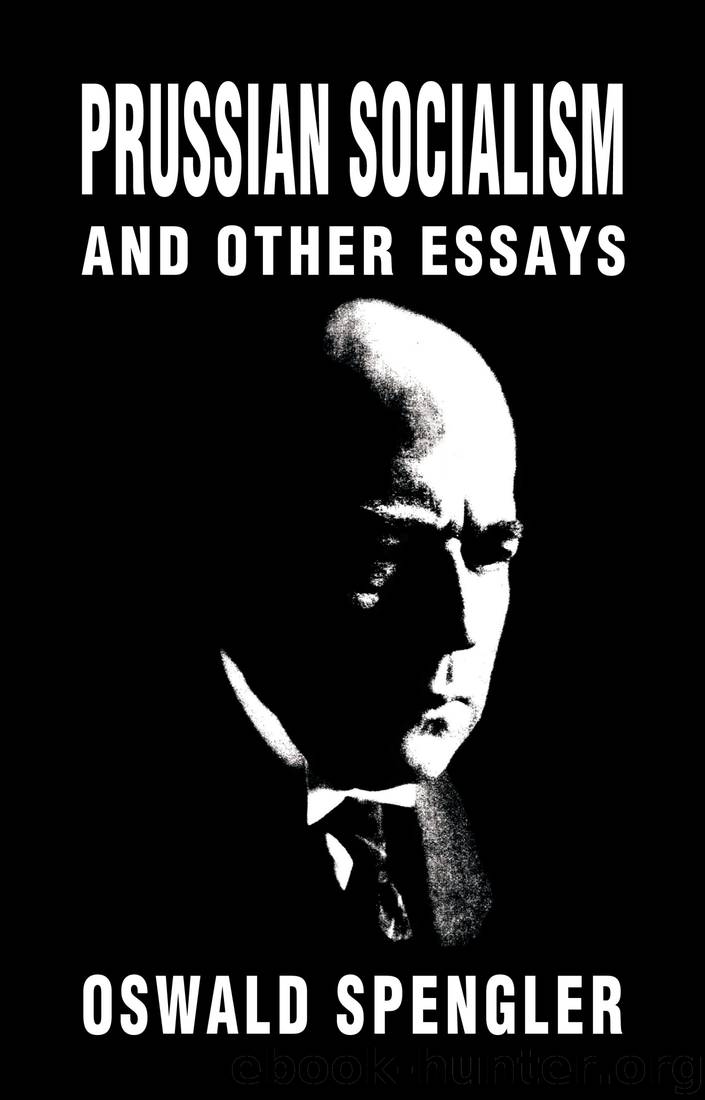Prussian Socialism & Other Essays by Oswald Spengler

Author:Oswald Spengler [Spengler, Oswald]
Language: eng
Format: epub
Tags: Prussian Socialism & Other Essays
Publisher: Black House Publishing
Published: 2018-10-16T04:00:00+00:00
* * *
1 I have addressed these questions in The Decline and Fall of Civilisations, Black House Publishing, 2018.
2 The Decline of The West, Vol. I.
3 Because of Nietzsche’s philosophy of will-to-power as struggle, an overcoming of obstacles as the basis of “evolution,” he is often confounded with Darwinism. Rather, Nietzsche wrote to confound Darwin with a contrary idea of “evolution” that was self-willed rather than biologically determined. He saw Darwinism as a degrading of man to an animalistic existent for survival rather than an upward urge towards infinity. In that sense this is also the “Faustian” imperative that Spengler used to describe the character of the Western soul. The two great influences on Spengler were Nietzsche and Goethe. (See: Bolton, “Nietzsche Contra Darwin: An Examination of the Nietzschean-Darwinian Pseudosynthesis,” in Southgate, Nietzsche: Thoughts & Perspectives Vol. III, Black Front Press, London, 2011. Also: Walter Kaufmann, Nietzsche: Philosopher, Psychologist, Antichrist, New York, 1968).
4 Spengler’s philosophy is a refutation of the notion of history as a darwinian–type evolution from “primitive to modern” “mankind;” a “march of humanity” upward. There is no such uniform “march,” no such reality as “progress” and no such entity as “mankind.” What Spengler shows is an unfolding of cultures with their own life-cycles. The perspective of Spengler’s time among scientists, politicians, and academics was that the 19th century had reached the epitome of “human” “progress,” where the blessings of a “world civilisation,” at the time heralded by Britain, the home of the Industrial Revolution, would be bestowed on every corner of the Earth. The same outlook persists, with spokesmen of our time such as Dr Francis Fukuyama using phrases like “the end of history” in “proving” that the Late West’s Liberalism is the ultimate destiny of “mankind” after which there is nothing more required.
5 However, Spengler as the herald of a new world-view for the Western Civilisation, was defeated and remains on the periphery. His historical-philosophy remains a heresy against what is “modern” and what is “progressive.” Even the “Right” has largely remained in the quagmire of 19th century materialism, and therefore rejects or at best under-rates Spengler.
6 Here is a key to Spengler’s historical-philosophy.
7 This lineal path of imagined ascent for “humanity” continues to be the dominant outlook of scientists, politicians and philosophers in “The West.”
8 It seems symptomatic of political unreality how Classical civilisation was imagined by Masons, Illuminati, Jacobins, Deists, and other “progressives,” whose perceptions of the Classical polity became models for the American and French Republics; as unreal as “Enlightenment” assumptions about the “Noble Savage.”
9 Spengler was by no means indifferent to art and aesthetic appreciation. However, in the Late or “Winter” epoch of a Civilisation such as the West has long entered, aesthetics become static and starts to degenerate in efforts to establish “new” schools such as Abstract Expressionism, Dada, and Surrealism, and even the atonal in music. The last course to greatness left for such a Civilisation is technical-military rather than aesthetic. Spengler devotes the last pages of The Decline of The West to this question.
Download
This site does not store any files on its server. We only index and link to content provided by other sites. Please contact the content providers to delete copyright contents if any and email us, we'll remove relevant links or contents immediately.
| Anarchism | Communism & Socialism |
| Conservatism & Liberalism | Democracy |
| Fascism | Libertarianism |
| Nationalism | Radicalism |
| Utopian |
The Secret History by Donna Tartt(16723)
The Social Justice Warrior Handbook by Lisa De Pasquale(11506)
Thirteen Reasons Why by Jay Asher(7833)
This Is How You Lose Her by Junot Diaz(5829)
Weapons of Math Destruction by Cathy O'Neil(5080)
Zero to One by Peter Thiel(4867)
The Myth of the Strong Leader by Archie Brown(4809)
Promise Me, Dad by Joe Biden(4478)
Beartown by Fredrik Backman(4465)
How Democracies Die by Steven Levitsky & Daniel Ziblatt(4448)
Stone's Rules by Roger Stone(4438)
The Fire Next Time by James Baldwin(4373)
100 Deadly Skills by Clint Emerson(4108)
A Higher Loyalty: Truth, Lies, and Leadership by James Comey(4059)
Rise and Kill First by Ronen Bergman(4045)
The David Icke Guide to the Global Conspiracy (and how to end it) by David Icke(3913)
The Farm by Tom Rob Smith(3895)
Secrecy World by Jake Bernstein(3808)
The Doomsday Machine by Daniel Ellsberg(3758)
